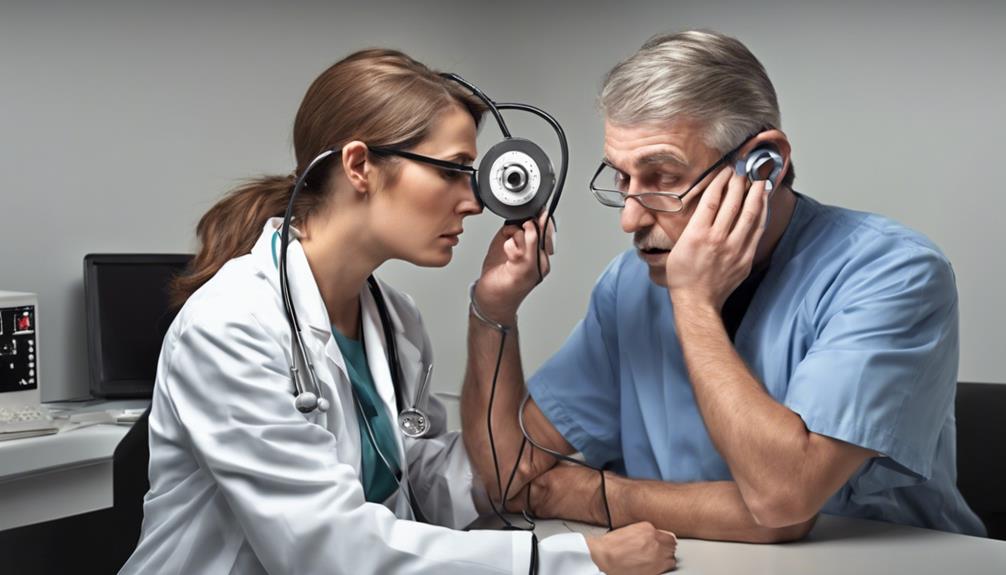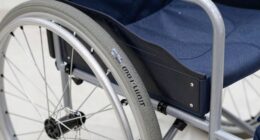Pacific Hearing Services is known for their exceptional dedication to providing customized solutions for individuals facing hearing challenges. With more than four decades of experience, they are highly respected for their commitment to improving the quality of life for those with hearing impairments.
But what sets them apart from the rest? Let's uncover the unique approach that has earned them the trust of many seeking top-notch hearing care solutions.
Key Takeaways
- Experienced audiologists prioritize diagnostic services.
- Cutting-edge technology enhances sound quality.
- Comprehensive hearing services tailored to individual needs.
- Trusted by Silicon Valley professionals and physicians.
Expert Audiologists and Cutting-Edge Technology
Featuring a team of experienced clinical audiologists, Pacific Hearing Services provides personalized care utilizing cutting-edge technology for optimal hearing solutions. When it comes to Hearing Care, our audiologists prioritize Diagnostic Hearing services to accurately assess each individual's needs. We understand the importance of Sound Quality in daily life, which is why we follow Best Practices to ensure our patients receive the highest standard of care. By combining our expertise with state-of-the-art technology, we strive to promote Healthy Hearing for all our patients.
At Pacific Hearing Services, we believe that thorough Diagnostic Hearing evaluations are essential for developing tailored treatment plans. Our team is dedicated to utilizing the latest advancements in technology to provide precise assessments and recommend the most suitable interventions. By focusing on Sound Quality during these evaluations, we can address any issues affecting our patients' ability to hear clearly. Our commitment to Best Practices guarantees that each individual receives the best possible care for their specific hearing needs, ultimately leading to improved overall Healthy Hearing.
Comprehensive Hearing Services Offered

With a focus on ensuring comprehensive care for our patients, Pacific Hearing Services offers a range of specialized services to address various hearing needs effectively. Our tailored approach to better hearing begins with comprehensive hearing assessments, allowing us to diagnose and understand each individual's unique hearing challenges.
Through the latest prescription hearing aid technology, we provide personalized solutions for optimal hearing improvement. For those experiencing tinnitus, our specialized treatment options aim to manage and alleviate symptoms, enhancing overall quality of life.
Additionally, our advanced hearing testing services ensure accurate diagnosis, leading to personalized treatment plans that cater to specific needs. At Pacific Hearing Services, we understand that the journey to better hearing is a personal one, and our diverse team of clinical audiologists is dedicated to guiding and supporting our patients every step of the way.
Choose Pacific Hearing Services for expert care and a commitment to your journey to better hearing.
Meet Our Skilled Team
Our dedicated team of skilled audiologists at Pacific Hearing Services is committed to providing compassionate and expert care for individuals seeking better hearing solutions. One of our incredible team members is Rebecca Coming, who has over 16 years of experience with Pacific Hearing Services. Rebecca manages the PHS school program for children with hearing impairment, holding a bachelor's degree from California State University, Fullerton, and a master's degree in Audiology from California State University, Los Angeles. She is licensed as an audiologist and hearing device dispenser in California, specializing in recommending and fitting students with appropriate classroom amplification. Rebecca also coordinates and conducts semi-annual diagnostic hearing evaluations for students in San Bernardino County, showcasing her expertise in the field. At Pacific Hearing Services in Rancho Cucamonga, Rebecca Coming and the rest of our team are dedicated to providing exceptional hearing healthcare services to improve the quality of life for individuals in the community.
| Name | Experience |
|---|---|
| Rebecca Coming | Over 16 years |
Trusted by Silicon Valley Professionals

Having earned the trust of top engineers in Silicon Valley, Pacific Hearing Services stands as a beacon of excellence in providing essential hearing healthcare services to professionals in the tech industry. For over 40 years, we've been dedicated to serving this innovative community, helping thousands of incredible people since. Our commitment to better hearing health has been instrumental in improving the lives of many individuals facing hearing loss challenges in Silicon Valley.
At Pacific Hearing Services, we understand the unique needs of Silicon Valley professionals and the importance of addressing hearing issues promptly and effectively. Our strong community partnerships with local organizations and companies reflect our deep-rooted presence in the tech industry. Physicians recommend us, and our reputation has been built on trust and exceptional service.
If you or someone you know is experiencing hearing difficulties, don't hesitate to call us. Pacific Hearing Services is here to provide top-notch hearing healthcare services tailored to meet the needs of Silicon Valley professionals.
Testimonials From Satisfied Clients
Earning glowing feedback from our valued clients, testimonials at Pacific Hearing Services illuminate the profound impact of our personalized care and expertise on individuals' lives. Over the past sixteen years, Pacific Hearing Services has had the privilege of caring for tens of thousands of incredible people, each with their unique hearing needs and challenges. The heartfelt testimonials we receive speak volumes about the transformative power of improved hearing and the exceptional service provided by our dedicated team.
Here are four poignant examples that showcase the difference Pacific Hearing Services has made in our clients' lives:
- Life-Altering Changes: Clients express gratitude for the life-changing impact of improved hearing on their daily lives.
- Personalized Care: Many testimonials highlight the personalized care and attention received from our team of audiologists.
- Expertise and Professionalism: Clients praise the expertise and professionalism demonstrated by the staff at Pacific Hearing Services.
- Compassionate Approach: Positive feedback emphasizes the compassionate and supportive nature of our approach to hearing healthcare.
Frequently Asked Questions
Why Are Hearing Aid Prices so High?
Hearing aid prices are high due to the advanced technology and research involved in their development, customization by audiologists, ongoing support, and premium materials used for durability. These factors contribute to the overall cost, providing users with quality performance, warranty, maintenance, and repair services.
Ultimately, the investment in a higher-priced hearing aid ensures a better experience and long-term satisfaction with improved hearing.
How Much Is a New Hearing System?
When looking for a new hearing system, prices can vary depending on the technology and features you choose. Options range from a few hundred to several thousand dollars, meeting different needs and budgets.
Customized solutions may cost more but offer tailored benefits. Advanced features like Bluetooth and noise reduction can increase the overall cost.
We ensure a range of pricing options to accommodate various financial situations, ensuring access to quality technology.
Who Is the Biggest Hearing Aid Company?
We believe the biggest hearing aid company globally is WS Audiology, formed by the merger of Widex and Sivantos.
Operating in over 125 countries, employing more than 10,000 people, they offer a wide range of solutions like behind-the-ear (BTE), in-the-ear (ITE), and receiver-in-canal (RIC) models.
Focused on innovation and technology, WS Audiology is dedicated to enhancing the lives of individuals with hearing loss through cutting-edge solutions and research.
What Are the Three Types of Hearing Tests?
Sure!
The three types of hearing tests include pure tone audiometry, speech audiometry, and tympanometry.
Pure tone audiometry measures a person's hearing sensitivity at different frequencies.
Speech audiometry assesses how well someone can understand speech at various volumes.
Tympanometry evaluates the health and function of the middle ear and eardrum.
These tests are crucial for diagnosing and managing hearing conditions, helping to determine the most suitable treatment options.
Conclusion
As we wrap up our journey with Pacific Hearing Services, we invite you to envision a symphony of sound restored, a world of clarity and connection.
Our team of expert audiologists, armed with cutting-edge technology, is dedicated to guiding you towards a life filled with vibrant conversations and joyful moments.
Let's be your partners in this beautiful harmonious journey towards better hearing and a brighter future.









